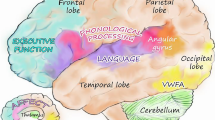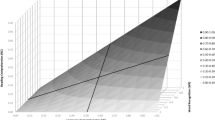Abstract
Reading comprehension is a complex cognitive task crucial to success in formal education and everyday life activities. Working memory (WM) and associated executive processes have been shown to be implicated in reading comprehension abilities. The aim of the present study was to assess the efficacy of a program for improving reading comprehension skills based on reading activities that require WM and associated executive processes. The study involved 48 third-graders (8–9 years old), who were assigned to three groups: a trained group that received training on reading comprehension and on the mechanisms related to this ability; an active control group that attended extra in-school activities designed to improve children’s reading comprehension; and a passive control group that only attended normal lessons. The training program consisted of ten sessions conducted in the classroom, focusing on WM and associated executive functions embedded in reading comprehension activities. The efficacy of the training was examined in terms of both specific improvements in reading comprehension and WM, and transfer effects to more ecological reading comprehension and nonverbal reasoning tasks. Long-term gains were also examined after 2 months. The results showed that the training was effective in directly improving the children’s reading comprehension and WM, with some maintenance effects too, while it elicited limited gains in the more ecological reading comprehension task, and no transfer effects on nonverbal reasoning. Overall, the present findings suggest that training involving the use of WM and its executive processes during reading comprehension activities is a promising approach to sustaining reading comprehension.
Similar content being viewed by others
References
Ackerman, P. L., Beier, M. E., & Boyle, M. O. (2005). Working memory and intelligence: the same or different constructs? Psychological Bulletin, 131(1), 30–60. doi:10.1037/0033-2909.131.1.30.
August, D., Francis, D. J., Hsu, H. A., & Snow, C. E. (2006). Assessing reading comprehension in bilinguals. The Elementary School Journal, 107(2), 221–238. doi:10.1086/510656.
Berkeley, S., Mastropieri, M. A., & Scruggs, T. E. (2011). Reading comprehension strategy instruction and attribution retraining for secondary students with learning and other mild disabilities. Journal of Learning Disabilities, 44(1), 18–32. doi:10.1177/0022219410371677.
Borella, E., & de Ribaupierre, A. (2014). The role of working memory, inhibition, and processing speed in text comprehension in children. Learning and Individual Differences, 34, 86–92. doi:10.1016/j.lindif.2014.05.001.
Borella, E., Carretti, C., & Pelegrina, S. L. (2010a). The specific role of inhibitory efficacy in good and poor comprehenders. Journal of Learning Disabilities, 43, 541–552. doi:10.1177/0022219410371676.
Borella, E., Carretti, B., Riboldi, F., & De Beni, R. (2010b). Working memory training in older adults: evidence of transfer and maintenance effects. Psychology and Aging, 25, 767–778. doi:10.1037/a0020683.
Borella, E., Ghisletta, P., & de Ribaupierre, A. (2011). Age differences in text processing: the role of working memory, inhibition and processing speed. Journal of Gerontology: Psychological Sciences, 66, 311--320. doi:10.1093/geronb/GBR002.
Caldarola, N., Perini, N., & Cornoldi, C. (2012). DLC: una prova di decisione lessicale per la valutazione collettiva delle abilità di lettura [DLC: a lexical decision task for the evaluation of reading decoding]. Dislessia, 9, 89–104.
Carretti, B., Cornoldi, C., De Beni, R., & Romano’, M. (2005). Updating in working memory: a comparison of poor and good comprehenders. Journal of Experimental Child Psychology, 91, 45–66.
Carretti, B., Borella, E., Cornoldi, C., & De Beni, R. (2009). Role of working memory in explaining poor comprehenders’ performance: a meta-analysis. Learning and Individual Differences, 19, 246–251.
Carretti, B., Borella, E., Zavagnin, M., & De Beni, R. (2013). Gains in language comprehension relating to working memory training in healthy older adults. International Journal of Geriatric Psychiatry, 28, 539–546. doi:10.1002/gps.3859.
Carretti, B., Caldarola, N., Tencati, C., & Cornoldi, C. (2014). Improving reading comprehension in reading and listening settings: the effect of two training programmes focusing on metacognition and working memory. British Journal of Educational Psychology, 84, 194–210. doi:10.1111/bjep.12022.
Cattell, R. B. (1979). Culture free, scale 2—forma A e B. Firenze: Organizzazioni Speciali.
Cattell, R. B., & Cattell, A. K. S. (1965). Culture Fair Intelligence Test: Scale 2. Champaign, IL: Institute for Personality and Ability Testing.
Cohen, J. (1988). Statistical power analysis for the behavioral sciences. Hillsdale: Lawrence Erlbaum.
Cornoldi, C., & Colpo, G. (2011). Prove di lettura MT-2 per la scuola primaria [Test for reading assessment in the primary school]. Firenze: Giunti OS.
Cornoldi, C., Carretti, B., Drusi, S., & Tencati, C. (2015). Improving problem-solving in primary school students: the effect of a training program focusing on metacognition and working memory. British Journal of Educational Psychology, 85, 424–439. doi:10.1111/bjep.12083.
Dahlin, K. (2011). Effects of working memory training on reading in children with special needs. Reading and Writing, 24, 479–491. doi:10.1007/s11145-010-9238-y.
Daneman, M., & Carpenter, P. A. (1980). Individual differences in working memory and reading. Journal of Verbal Learning and Verbal Behavior, 19, 450–466. doi:10.1016/S0022-5371(80)90312-6.
Daneman, M., & Merikle, P. M. (1996). Working memory and language comprehension: A metaanalysis. Psychonomic Bulletin and Review, 3, 422--433. doi:10.3758/BF03214546.
De Beni, R., Palladino, P., Pazzaglia, F., & Cornoldi, C. (1998). Increases in intrusion errors and working memory deficit of poor comprehenders. Quarterly Journal of Experimental Psychology: Human Experimental Psychology, 51A, 305–320. doi:10.1080/713755761.
De Beni, R., Borella, E., & Carretti, B. (2007). Reading comprehension in aging: the role of working memory and metacomprehension. Aging, Neuropsychology, and Cognition, 14, 189–212. doi:10.1080/13825580500229213.
García-Madruga, J. A., Elosúa, M. R., Gil, L., Gómez-Veiga, I., Vila, J. O., Orjales, I., et al. (2013). Reading comprehension and working memory’s executive processes: an intervention study in primary school students. Reading Research Quarterly, 48, 155–174. doi:10.1002/rrq.44.
Henry, L. A., Messer, D. J., & Nash, G. (2014). Testing for near and far transfer effects with a short, face-to-face adaptive working memory training intervention in typical children. Infant and Child Development, 23, 84–103. doi:10.1002/icd.1816.
Jaeggi, S. M., Buschkuehl, M., Jonides, J. & Perrig, W. J. (2008). Improving fluid intelligence with training on working memory. Procedings of the National Academy of Science, 105, 6829--6833. doi:10.1073/pnas.0801268105.
Jaeggi, S. M., Buschkuehl, M., Jonides, J., & Shah, P. (2011). Short- and long-term benefits of cognitive training. Proceedings of the National Academy of Sciences, 108, 10081–10086. doi:10.1073/pnas.1103228108.
Karbach, J., & Verhaeghen, P. (2014). Making working memory work: a meta-analysis of executive control and working memory training in older adults. Psychological Science, 25, 2027–2037. doi:10.1177/0956797614548725.
Klingberg, T., Forssberg, H., and Westerberg, H. (2002). Training of working memory in children with ADHD. Journal of Clinical Experimental Neuropsychology, 24, 781–791. doi:10.1076/jcen.24.6.781.8395.
Klingberg, T., Fernell, E., Olesen, P. J., Johnson, M., Gustafsson, P., Dahlström, K., et al. (2005). Computerized training of working memory in children with ADHD: a randomized, controlled trial. Journal of the American Academy of Child and Adolescent Psychiatry, 44, 177–186. doi:10.1097/00004583-200502000-00010.
Lajoie, S. P. (2008). Metacognition, self-regulation, and self-regulated learning: a rose by other name? Educational Psychology Review, 20, 469–475. doi:10.1007/s10648-008-9088-1.
Loosli, S. V., Buschkuehl, M., Perrig, W. J., & Jaeggi, S. M. (2012). Working memory training improves reading processes in typically developing children. Child Neuropsychology: A Journal on Normal and Abnormal Development in Childhood and Adolescence, 18, 62–78. doi:10.1080/09297049.2011.575772.
Melby-Lervåg, M., & Hulme, C. (2012). Is working memory training effective? A meta-analytic review. Developmental Psychology, 49, 270–291. doi:10.1037/a0028228.
Miyake, A., & Shah, P. (1999). Models of working memory: mechanisms of active maintenance and executive control. New York, NY, US: Cambridge University Press.
Morra, S., & Borella, E. (2015). Working memory training: from metaphors to models. Frontiers in Psychology, Section Developmental Psychology, 6, 1097. doi:10.3389/fpsyg.2015.01097.
Noack, H., Lövdén, M., & Schmiedek, F. (2014). On the validity and generality of transfer effects in cognitive training research. Psychological Research, 78, 773–789. doi:10.1007/s00426-014-0564-6.
Palladino, P., Cornoldi, C., De Beni, R., & Pazzaglia, F. (2001). Working memory and updating processes in reading comprehension. Memory and Cognition, 29, 344–354. doi:10.3758/BF03194929.
Sesma, H. W., Mahonea, E. M., Levine, T., Eason, S. H., & Cutting, L. E. (2009). The contribution of executive skills to reading comprehension. Child Neuropsychology, 15, 232–246. doi:10.1080/09297040802220029.
Shipstead, Z., Redick, T. S., & Engle, R. W. (2010). Does working memory training generalize. Psychologica Belgica, 50(3–4), 245–276. doi:10.5334/pb-50-3-4-245.
Siegel, L. S. (1994). Working memory and reading: a life-span perspective. International Journal of Behavioural Development, 17, 109--124. doi:10.1177/016502549401700107.
Spooner, A. L. R., Gathercole, S. E., & Baddeley, A. D. (2006). Does weak reading comprehension reflect an integration deficit? Journal of Reading Research, 29, 173–193. doi:10.1111/j.1467-9817.2006.00284.x.
Swanson, H. L. (1996). Individual and age-related differences in children's working memory. Memory & Cognition, 24, 70--82.
Thurstone, T. G., & Thurstone, L. L. (1963). Primary mental ability. Chicago: Science Research Associates.
Weisz, J. R., & Hawley, K. M. (2001). Procedural and coding manual for identification of evidencebased treatments. Los Angeles: University of California.
Author information
Authors and Affiliations
Corresponding author
Rights and permissions
About this article
Cite this article
Carretti, B., Borella, E., Elosúa, M.R. et al. Improvements in Reading Comprehension Performance After a Training Program Focusing on Executive Processes of Working Memory. J Cogn Enhanc 1, 268–279 (2017). https://doi.org/10.1007/s41465-017-0012-9
Received:
Accepted:
Published:
Issue Date:
DOI: https://doi.org/10.1007/s41465-017-0012-9




